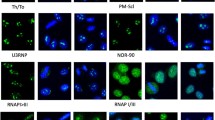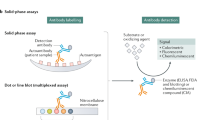Abstract Serum containing anti-U1RNP antibodies reacts with the nuclear matrix, the relatively insoluble component of the cell nucleus, in addition to U1RNP. In this study, we determine the serum titer and clinical correlations of antinuclear matrix antibodies in samples from patients with anti-U1RNP antibodies. The patients with anti-U1RNP antibodies were classified as having mixed connective tissue disease (MCTD, 15 patients), systemic sclerosis (SSc, 12 patients), systemic lupus erythematosus (SLE, 7 patients), and undifferentiated CTD (UCTD, 9 patients). Antinuclear matrix antibodies were detected using indirect immunofluorescence staining on HCl-treated HEp-2 cells. The antinuclear matrix antibody titer was significantly higher in serum from patients with MCTD or SSc than in serum from patients with SLE or UCTD. The antinuclear matrix antibody titer was significantly increased in serum from patients with sclerodactyly, pitting scars, contracture of the phalanges, and decreased carbon monoxide diffusion capacity. Thus, a higher titer of antinuclear matrix antibodies in serum from patients with anti-U1RNP antibodies may be associated with a clinical diagnosis of MCTD or SSc rather than a diagnosis of SLE or UCTD.
Similar content being viewed by others
Author information
Authors and Affiliations
Additional information
Received: 6 July 1999 / Revised: 11 October 1999 / Accepted: 27 October 1999
Rights and permissions
About this article
Cite this article
Sato, S., Hasegawa, M., Ihn, H. et al. Clinical significance of antinuclear matrix antibody in serum from patients with anti-U1RNP antibody. Arch Dermatol Res 292, 55–59 (2000). https://doi.org/10.1007/s004030050010
Issue Date:
DOI: https://doi.org/10.1007/s004030050010




